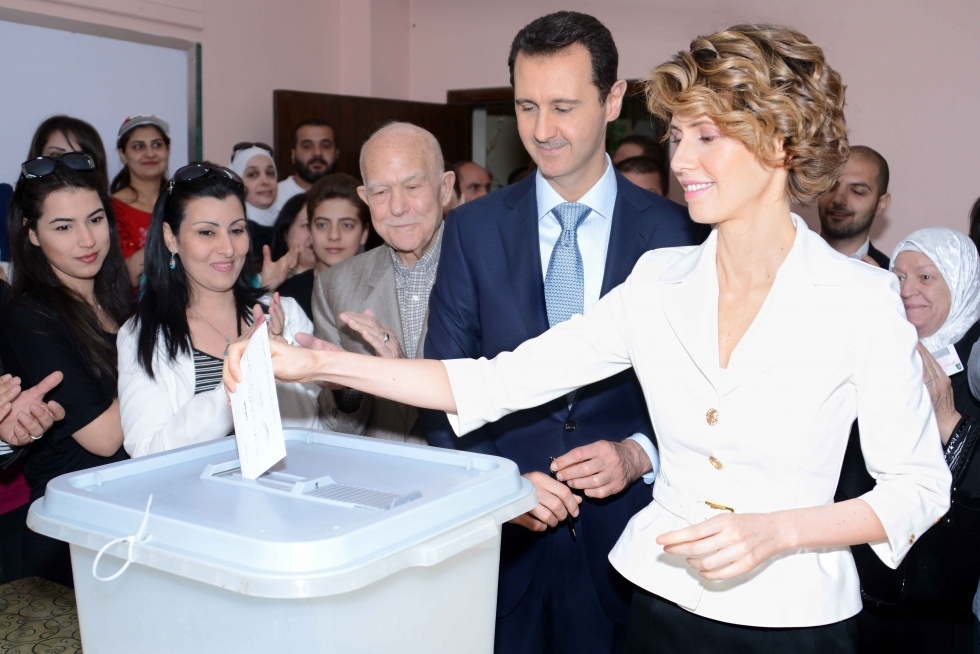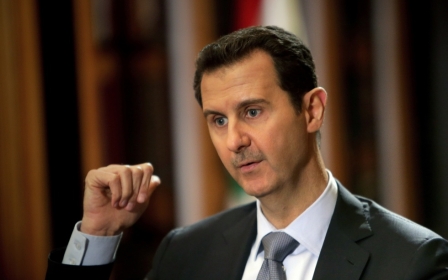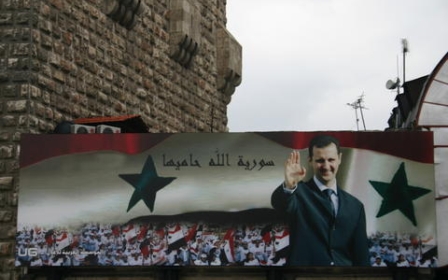An election steeped in charade

According to the popular saying, “a picture is worth a thousand words”, but it can also be misleading. During Syria’s rubber-stamp presidential “election” the mainstream media - the ones Bashar al-Assad's supporters love to hate - filled our TV screens with footage of Syrian refugees queuing to vote.
Whether by interviewing them about their love for Assad, or simply filming their large numbers, the implication was that he is genuinely popular among displaced Syrians. This distortion was echoed in print and online.
“The massive turnout for the expatriate Syrian vote at the embassy above Beirut produced scenes rarely observed at any embassy or polling station in the world,” reported BBC Middle East correspondent Jim Muir. “At times it turned into a rowdy support rally” for Assad.
“The strength and assertiveness of the vote may have reflected an underlying feeling among many Syrians abroad that the tide is running in the regime’s favour, and it is time to climb aboard,” Muir speculated.
The Agence France-Presse and Associated Press news agencies reported that “tens of thousands” of Syrians in Lebanon “flocked” to their embassy in Beirut to vote. AP added that Syrians “desperate to vote” for Assad “tried to rush” the embassy, “scuffling with Lebanese troops using batons and sticks to beat the crowds back”. In Lebanon, “the election turned into a massive show of support for Assad”.
Such images and statements hide unpleasant truths. Those who voted were overwhelmingly pro-Assad because his opponents saw no point partaking in a sham election whose result was a foregone conclusion. Indeed, there were numerous protests among displaced Syrians, though they did not get as much coverage.
Refugees said they had received various threats - such as not being allowed to re-enter Syria, or having their homes confiscated - if they did not vote. Given the amply demonstrated brutality and repression of the Assad regime, such threats no doubt caused alarm, and may have resulted in coerced balloting.
Similarly, there were reports of men - identifying themselves as members of a Lebanese political party allied to Assad - asking Syrian refugees who would be voting, and taking down names. “Their presence was a reminder to the more than one million Syrian refugees in Lebanon that they are still within the reach of [the] Damascus government,” Reuters reported.
Genuine polling
A far more revealing and credible poll than that organised by Damascus was conducted by the Arab Center for Research and Policy Studies. Published on 2 June, it surveyed internally displaced Syrians, as well as refugees in Lebanon, Jordan and Turkey (which by April were hosting some 87 percent of the total refugee population), about their attitudes towards the election and the war in general.
The findings clearly highlight how farcical the election results are, and how misleading media coverage has been in this regard. The survey also shatters the prevailing narrative of Assad gaining support or grudging acceptance from Syrians who were either on the fence or pro-opposition.
The vast majority of internally displaced Syrians and refugees (78 percent) view the election as illegitimate, and think their country would be better off if Assad stepped down. Only 17 percent say the election is legitimate and oppose his abdication. Almost two-thirds (64 percent) say the ideal solution to the crisis is regime change, whereas only 6 percent say it is Assad’s victory over the opposition.
Support for the regime has actually fallen, from 19 percent during the first six months of the revolution, to a mere 13 percent after three years. Support for the opposition increased over the same period, from 52 percent to 60 percent.
The survey’s results have a particular significance given the huge number of internally displaced Syrians and refugees. By March, the figure exceeded 9 million (more than 6.5 million and 2.5 million, respectively), representing over 40 percent of the entire Syrian population, according to the UN. These numbers continue to rise.
The opinions and size of Syria’s displaced provide further damning evidence of the charade that was the presidential election. Voting only took place in regime-controlled areas (thus excluding large swaths of the country), and even there Syrians reported coming under pressure to re-elect Assad. The other two puppet candidates played ball throughout, heaping praise on their supposed challenger.
Election “monitoring” was carefully choreographed, comprising sympathetic observers, and thereby lacking any credibility or independence. In addition, opponents of Assad who could vote had no incentive to do so. As such, his victory of 88.7 percent (unheard of in genuine elections) reflects not the endorsement of the Syrian people, but of his supporters and those pressured to cast their ballots.
This is a mockery of democracy, made worse by media coverage giving the impression that Syria's refugees and internally displaced were willing and eager participants. How must it feel to be dispossessed by a regime, only to be perceived as supporting it?
- Sharif Nashashibi is an award-winning journalist and analyst on Arab affairs. He is a regular contributor to Al Arabiya News, Al Jazeera English, The National, and The Middle East magazine. In 2008, he received an award from the International Media Council "for both facilitating and producing consistently balanced reporting" on the Middle East.
The views expressed in this article belong to the author and do not necessarily reflect the editorial policy of Middle East Eye.
Photo credit: A handout picture released by the official Syrian Arab News Agency shows Syrian President Bashar al-Assad (C) watching on as his wife Asma casts her vote at a polling station in Maliki (AFP PHOTO /SANA)
New MEE newsletter: Jerusalem Dispatch
Sign up to get the latest insights and analysis on Israel-Palestine, alongside Turkey Unpacked and other MEE newsletters
Middle East Eye delivers independent and unrivalled coverage and analysis of the Middle East, North Africa and beyond. To learn more about republishing this content and the associated fees, please fill out this form. More about MEE can be found here.





